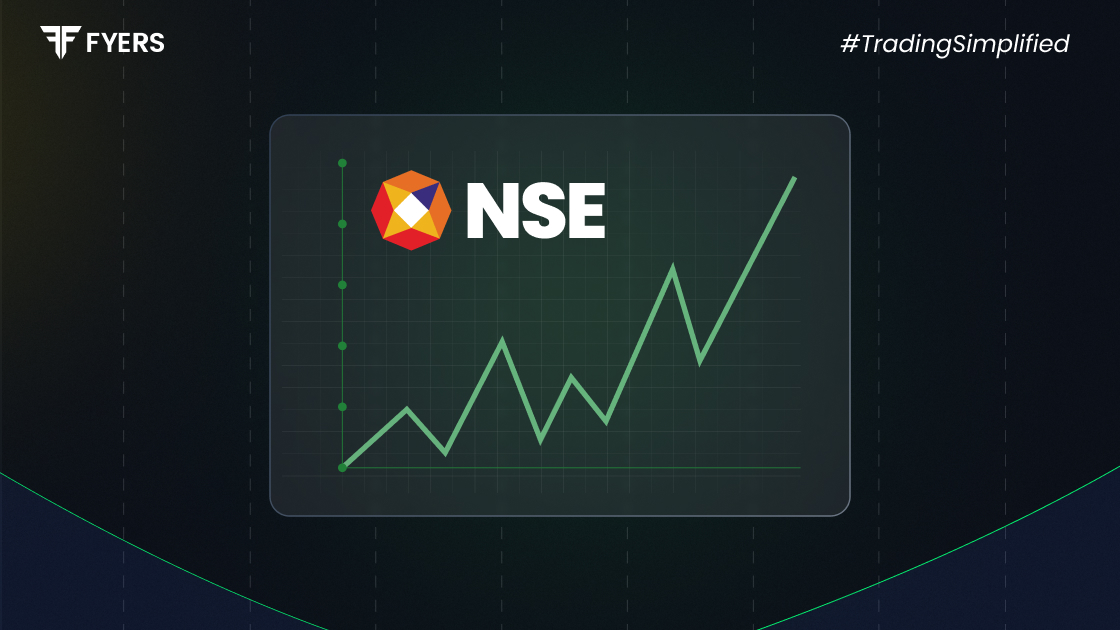

 31 Jul, 2025
31 Jul, 2025
 4 mins read
4 mins read

The National Stock Exchange (NSE) is one of India's most prominent financial institutions. It plays a crucial role in the country's capital market by providing a platform for trading equity, derivatives, debt, and other financial instruments. Whether you're a beginner or a market enthusiast, understanding how NSE operates can help you make informed financial decisions.
The National Stock Exchange of India Limited (NSE) is a leading stock exchange in India. It offers a transparent and efficient platform for trading in various financial instruments. NSE was the first exchange in India to provide a modern, fully automated electronic trading system, which revolutionised the Indian capital market.
It serves as a marketplace where buyers and sellers of securities come together to transact in a regulated environment.
NSE works as an online platform where trading is conducted electronically. Here’s how it functions:
Order Matching: NSE uses a computer-driven order-matching system that matches buy and sell orders automatically.
Trading Members: Only registered trading members and brokers can execute trades on behalf of clients.
Clearing and Settlement: After a trade is executed, it is settled through NSE Clearing Limited, which ensures timely and secure settlement
Surveillance and Monitoring: NSE monitors trading activities in real time to detect unusual patterns and ensure compliance with regulations.
The entire system is designed for speed, transparency, and security.
NSE has several distinctive features that make it a leader in the Indian stock market:
Electronic Trading: No physical trading floors; everything is done electronically.
Nationwide Access: Investors across India can trade through the NSE platform.
Wide Range of Products: Equity, derivatives, debt, currency, and mutual fund units.
Transparency: Real-time data and price dissemination ensure market efficiency.
Investor Protection: Strict regulations and surveillance mechanisms protect investor interests.
NSE was established in 1992 and became operational in 1994 with the launch of the wholesale debt market. In 1994, it also introduced the equity market segment. NSE was founded by a group of leading financial institutions at the behest of the Indian government to bring greater transparency to the capital markets.
Here are some key milestones:
1994: Launch of equity and wholesale debt segments.
1995: Commencement of derivatives trading.
2000: NSE became the largest exchange in India in terms of daily turnover.
Present: NSE is among the world's top stock exchanges by market capitalisation.
The National Stock Exchange performs several important functions:
Capital Formation: Provides companies with a platform to raise capital from investors.
Liquidity: Ensures that investors can buy and sell securities with ease.
Price Discovery: Facilitates efficient price discovery through competitive bidding.
Investor Education: Promotes financial literacy through various awareness programmes.
Regulation and Surveillance: Ensures compliance and fair trading practices.
Indices serve as indicators of market performance. NSE has developed several indices to track different market segments. The most notable ones include:
|
Index |
Description |
|---|---|
|
Nifty 50 |
Tracks the top 50 large-cap companies listed on NSE. |
|
Nifty Next 50 |
Covers the next 50 companies after the Nifty 50. |
|
Nifty Bank |
Represents the performance of banking sector stocks. |
|
Nifty IT |
Includes major information technology sector companies. |
|
Nifty Midcap 150 |
Tracks performance of mid-sized companies. |
These indices help investors track market trends and make informed investment decisions.
To trade on the NSE, follow these simple steps:
Open a Demat and Trading Account: Choose a SEBI-registered broker to open your accounts.
Complete KYC: Submit PAN, Aadhaar, bank details, and other required documents.
Fund Your Account: Transfer money into your trading account.
Place Orders: Use your broker's platform to buy or sell shares.
Monitor and Settle Trades: After execution, trades are settled through the clearing house.
It is advisable to gain basic market knowledge or consult a financial advisor before starting.
The National Stock Exchange has transformed the Indian financial landscape with its technology-driven approach, transparency, and efficiency. By offering a wide range of financial instruments and ensuring investor protection, NSE continues to play a vital role in India’s economic growth. Whether you're a novice or a seasoned investor, understanding how NSE functions can guide better investment decisions.
NSE stands for National Stock Exchange.
NSE was established in 1992 and started operations in 1994.
The Securities and Exchange Board of India (SEBI) regulates NSE.
Yes, foreign investors can invest in NSE-listed stocks under regulations set by SEBI and the Reserve Bank of India (RBI).
Calculate your Net P&L after deducting all the charges like Tax, Brokerage, etc.
Find your required margin.
Calculate the average price you paid for a stock and determine your total cost.
Estimate your investment growth. Calculate potential returns on one-time investments.
Forecast your investment returns. Understand potential growth with regular contributions.